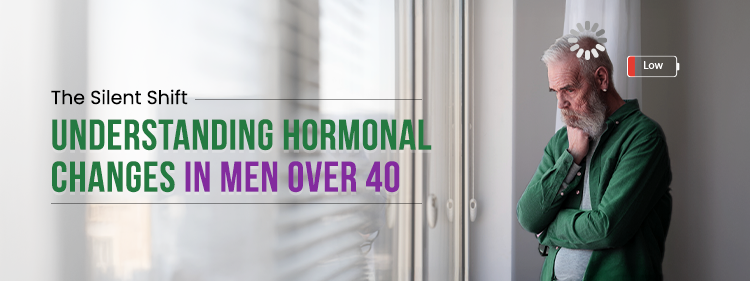
August 30, 2025
Postpartum Depression Help: What New Moms Need to Know Right Now
347-843-0789
doctors@doctorstohealth.com

We often hear about women navigating menopause, but what about men? The truth is, men go through their own hormonal changes too just quieter, slower, and far less talked about. This phase is called andropause (sometimes nicknamed “male menopause”), and while it won’t hit you like a lightning bolt, it sneaks up on many men in their 40s and beyond.
One day you’re powering through workouts and late nights, and the next you’re wondering why coffee isn’t fixing your fatigue, your motivation feels off, and your waistline seems to be plotting against you. Let’s break down what’s really going on.
Andropause is simply the gradual decline in testosterone levels, the hormone that fuels energy, muscle mass, libido, and even that spark of confidence.
Unlike women, who experience a sharp hormonal drop during menopause, men lose testosterone bit by bit about 1% per year after 40. That may not sound like much, but stack a few years together and you’ll start noticing shifts in how your body and mind feel.
These aren’t just “getting older” quirks. Some red flags include:
–> Feeling tired all the time even with decent sleep
–> Lower sex drive or performance changes in the bedroom
–> Mood swings or irritability that catch you (and others) off guard
–> Struggling to build or keep muscle despite exercise
–> Weight gain, especially around the midsection
–> Brain fog or difficulty focusing
–> Trouble sleeping or restlessness at night
Sound familiar? You’re not alone, millions of men experience these symptoms but rarely talk about them.
Yes, part of it is just biology. But lifestyle plays a huge role too. Stress, processed foods, lack of exercise, and poor sleep can accelerate testosterone decline. Conditions like obesity, diabetes, or heart disease can make things even worse.
Quick clarification: Men don’t have a dramatic “end point” to their fertility like women do. While andropause is often compared to menopause, it’s more about hormonal imbalance and quality of life than reproductive shut-down. Men can still father children later in life, though fertility and desire might take a hit.
Here’s the good news this isn’t an “accept your fate” situation. There are ways to manage and even reverse some of the effects.
–> Lift weights, move daily, get your heart rate up
–> Eat more whole foods think lean proteins, good fats, leafy greens
–> Prioritize real sleep (scrolling Instagram in bed doesn’t count)
–> Manage stress meditation, golf, music, whatever calms your system
For some men with clinically low levels, TRT can be life-changing. It can boost energy, mood, and libido but it’s not for everyone. Always consult a doctor, because it comes with risks that need monitoring.
Supplements like Vitamin D, Zinc, and Ashwagandha have shown promise in supporting testosterone levels. They won’t work miracles, but they can help when paired with a healthy lifestyle.
The biggest danger isn’t testosterone decline, it’s ignoring it. Leaving andropause unchecked can increase risks of heart disease, diabetes, osteoporosis, and mental health struggles. Taking it seriously now means staying active, sharp, and confident for decades to come.
Andropause isn’t something to fear, it’s something to acknowledge. Think of it as your body sending you signals that it needs a new playbook. With the right lifestyle tweaks, medical guidance, and awareness, you can still feel strong, vibrant, and in control well into your 40s, 50s, and beyond.
Aging doesn’t mean fading, it means evolving. And if you play it smart, your best years might still be ahead of you.
Feeling the silent shift? Don’t ignore the signs of low testosterone.
Book your checkup with Drs2Health today because aging strong starts with knowing your numbers.

Leave a comment